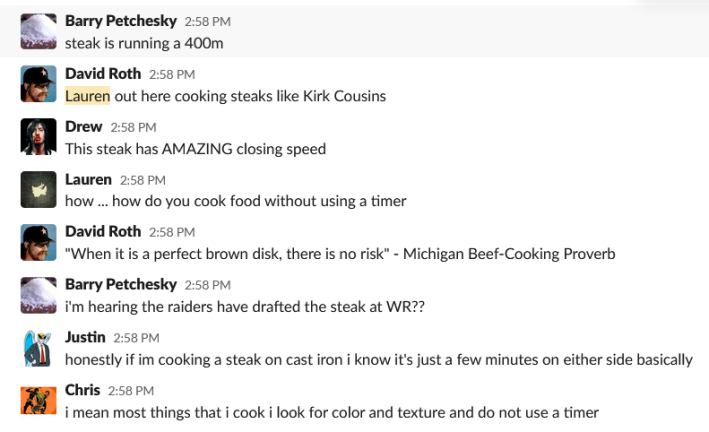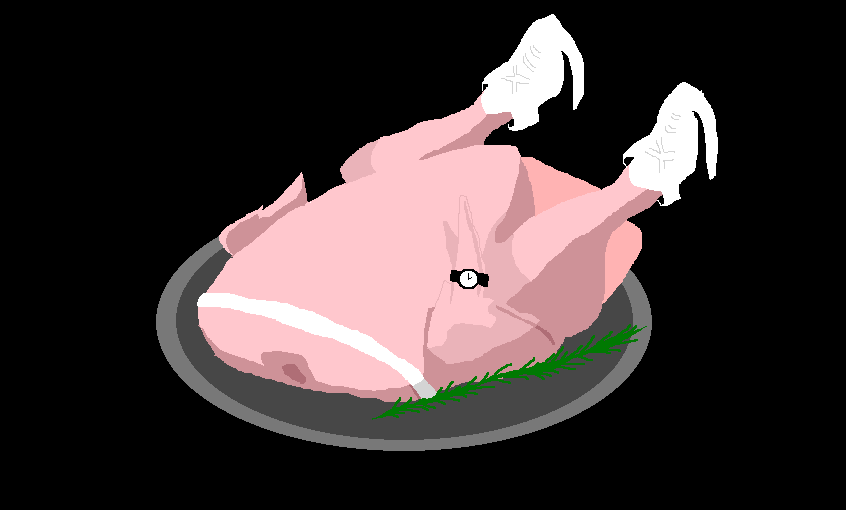For the first time in my life, this year I'll be spending Thanksgiving outside of the glorious state of Michigan, instead sharing the holiday with just one other person in my NYC apartment, for obvious reasons. And also for the first time in my life, I'll be contributing a significant share of the labor towards the big dinner. Since my pal has to work on Thursday and I do not, the food that needs to be cooked the day of and be hot and ready at just the right time—in this case, the stuffing, the spicy roasted potatoes, and the steaks (yeah, the steaks!)—is all my responsibility.
I'll be honest: I'm a little scared! While I am immensely sad that I won't be watching the Lions and eating turkey with my family, almost all of whom I haven't seen in nearly a year, I have also at least half-convinced myself that a combination of a solid, well-planned dinner, a Detroit victory over the vile Houston Texans, and the magic of Good Vibes and Positive Thinking may be enough to paper over the emptiness I know I'll be feeling.
Simply put, I'm hopeful that things to go as well as they can on Thursday. But I am also extremely aware that whether this Thanksgiving will be remembered as a depressing disaster or a scrappy success hinges largely on my undeveloped cooking abilities. I have not prepared steak in something like two years. Stuffing is far from what I would call a staple of my diet. The concept of having multiple burners going at once stresses me out. While many kind folks have been very encouraging to me as I prepare for this undertaking and have downplayed the extent of the intimidating challenge that lies ahead, there still remains a non-zero chance that I overcook the steak, simmer the stuffing into a pile of mush, or set the potatoes on fire and briefly experience a mental break in which I try to smother the flames with the cranberry sauce. Because of the way my brain is wired, these scenarios loom larger in my head than any vision of success.
Luckily, there is a tool I can use to help both mitigate my chances of failure and calm my troubled mind. It is called a "timer" or a "stopwatch," and chances are, if it's not a part of your kitchen's oven or microwave, you can find it right on your smartphone! What this tool does is measure specific amounts of time, either by counting down from a set number of hours and/or minutes (in the case of a timer) or by counting up from zero for an indefinite period of time (in the case of a stopwatch). And it does all this without requiring any effort from you, the chef. That's right, no more "one Mississippis!" This invention does it for you.
The timer/stopwatch comes in handy because, for anyone who is not an advanced and experienced chef, cooking is a science, not an art, and almost all recipes (with maybe one enjoyably notable exception in the genre) include a specific amount of time for which the food needs to cook. The recipe exists because someone counted, using a timing device, how long it took for the food to be cooked, and wrote it down so that you, with your own device, can cook the food for the same amount of time. Potatoes, for example, can roast in the oven for 35–40 minutes, and you should stir them up every 10. A medium-rare reverse-seared steak, I'm informed, should warm up in the oven for 25–30 minutes and then be finished on the skillet for 45 seconds per side. This is simple. This is straightforward. These are instructions I can follow. These fit neatly into a plan that allows me to know ahead of time when to begin making each dish, so as to serve all portions of the dinner at the exact moment my friend and I would like to eat them. And that plan can be carried out to perfection in any kitchen in the whole damn world, thanks to the cold, objective nature of minutes and seconds.
But there are vigilante cooks out there who take matters into their own hands. In fact, some of them work at this very website. These rugged individualists would rather use their own untrustworthy senses to determine if their food is done, while ignoring Father Time entirely. They'll look at it. They'll smell it. They'll poke it. They'll use some convoluted method where you put some pressure on your palm and compare its firmness to the steak. But when a bright-eyed aspiring Thanksgiving chef suggests, "Uh, hey, you know you could just time how long the food has been cooking and compare it with the instructions," she is mocked—yes, mocked!—and compared to an overzealous NFL scout by many of her supposed business partners.

This Thanksgiving, I feel qualified to give you just this one bit of advice. Do not be like these fools. Humanity has evolved to the point that you now have an advanced, exact little hourglass accessible from the palm of your hand in all of your waking moments. To eschew this technological marvel in order to prepare meals the way that they did in the Dark Ages—"Food look good. I eat food."—is uncivilized. If you are a professional chef, or if you have Daredevil-like perception, or if you have a metronome implanted in your brain, you can feel free to disregard my two cents. But for all of us painfully human amateurs, the timer is all that stands between our feeble senses and kitchen chaos. Disrespect its wisdom at your own peril.






